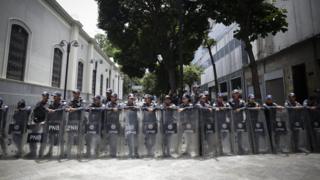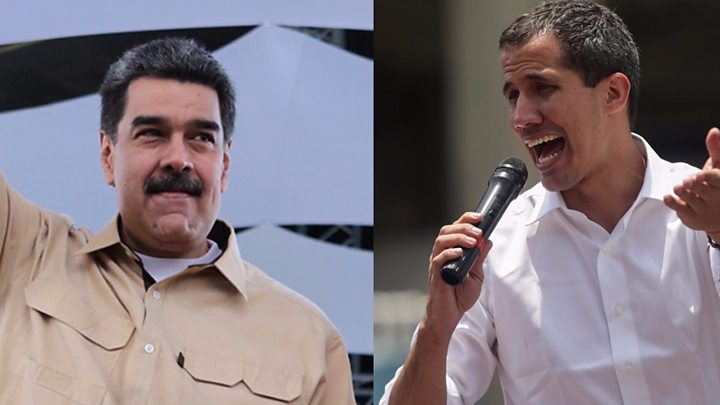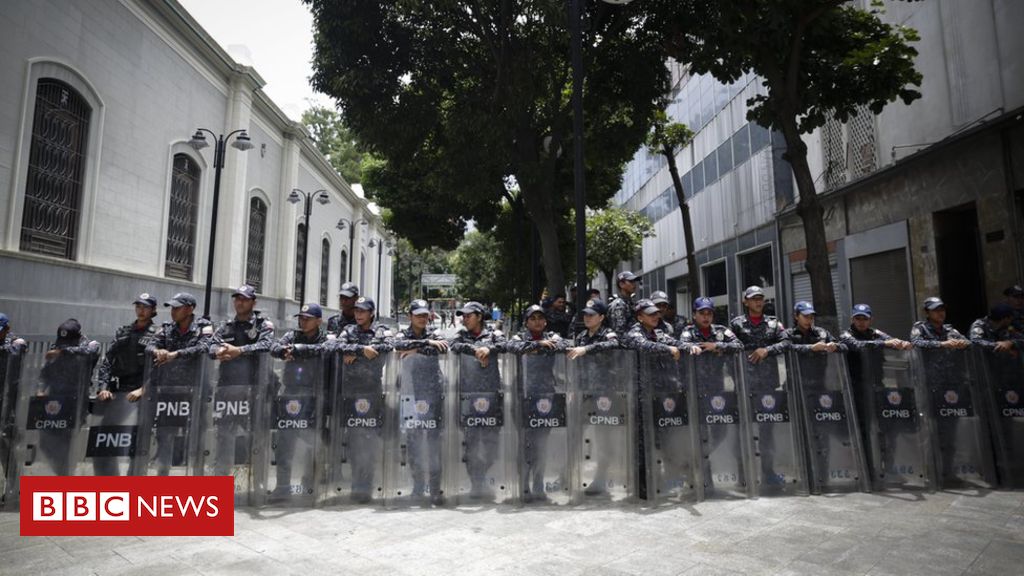 Image copyright
Image copyright
Getty Images
Lawmakers were prevented from entering the National Assembly
Venezuela’s Supreme Court has accused four opposition members of parliament of treason and conspiracy, days after making similar accusations against 10 other lawmakers.
They all supported opposition leader Juan Guaidó in a failed effort to spark a military rebellion against President Nicolás Maduro in April.
Last week, one lawmaker was arrested and several took refuge in embassies.
Meanwhile on Tuesday, security forces blocked off the parliament building.
Members of the Sebin intelligence service, national police and military prevented lawmakers from attending a session at the opposition-controlled National Assembly in the capital, Caracas.
Lawmakers were scheduled to discuss the Supreme Court’s decision to annul the parliamentary immunity of several of their colleagues and the arrest of Edgar Zambrano, the assembly’s vice-president.
The security forces said they were investigating a possible explosive device inside the building, according to lawmakers.
“This is all part of a show to prevent the National Assembly from functioning,” lawmaker Juan Pablo Guanipa told Reuters news agency. “This is a dictatorship that goes after dissidents, and we’re fighting for a political change.”
Mr Guaidó, who has previously accused Mr Maduro of tying to close the National Assembly, said on Twitter: “They’re trying to hold the legislative power hostage while the dictator entrenches himself alone in a palace where he shouldn’t be.”
President Maduro has intensified a crackdown on the opposition since their failed uprising on 30 April.
The four lawmakers accused were Carlos Paparoni, Miguel Pizarro, Franco Casella and Winston Flores. Mr Pizarro and Mr Flores called the accusations “illegitimate”.
The National Assembly has been stripped of its powers since Mr Maduro’s ruling Socialist Party lost control of it in 2016. He then set up the National Constituent Assembly, controlled by loyalists.

Media playback is unsupported on your device
Last week, three opposition lawmakers took shelter in foreign embassies after losing their congressional immunity. Meanwhile, there has been no word from Mr Zambrano since his dramatic arrest last Wednesday.
Mr Guaidó, who is the head of the National Assembly, declared himself interim president in January and has been recognised by more than 50 nations, including the US and most in Latin America. President Maduro retains the support of the military’s top ranks and of allies including Russia, China and Turkey.
In a separate development, human rights group Amnesty International said it believed Venezuelan authorities committed crimes against humanity in their crackdown on anti-government protests in January.
The group urged the International Criminal Court and the UN Human Rights Council to investigate the allegations.
“[T]here is a systematic policy of repression against opponents or those perceived to be opponents simply because they are protesting, for which Nicolás Maduro’s government must be held accountable before the international justice system,” Amnesty’s Americas director Erika Guevara-Rosas said in a statement.
